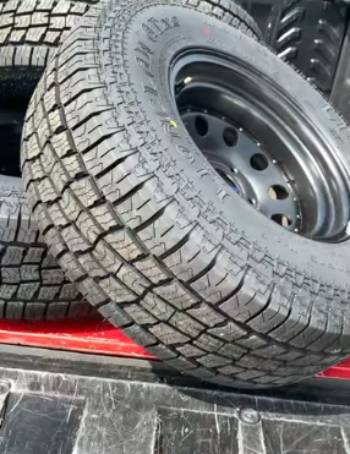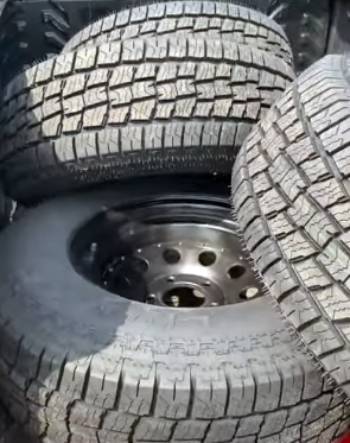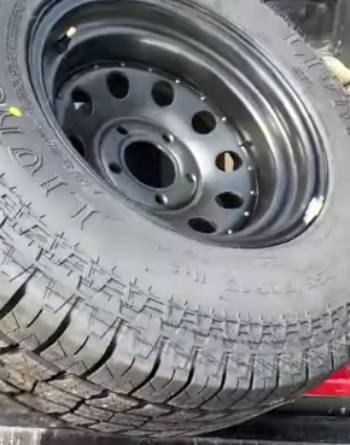I’m stoked to share my experience with the Lionhart Lionclaw ATX2 tires, a budget-friendly all-terrain option that’s perfect for your SUV or light truck.
In this 3,200-word review, I’ll walk you through my real-world testing, highlighting pros, cons, and key features to help you decide if these tires fit your ride.
With a comparison table and practical insights, you’ll see why these tires are a steal.
Whether you’re hitting trails or highways, I’ve got you covered. Let’s roll into why you need these tires!
Comparison Table: Lionhart Lionclaw ATX2 Vs. Competitors
| Feature | Lionhart Lionclaw ATX2 | Cooper Discoverer AT3 4S | BFGoodrich All-Terrain T/A KO2 |
| Price (per tire) | $83.98–$208 | $129.99–$250 | $179.99–$350 |
| Tread Life Warranty | 40,000 miles | 65,000 miles | None |
| Sizes | 15″–20″ | 15″–22″ | 15″–22″ |
| Terrain | All-terrain, light off-road | All-terrain, moderate off-road | All-terrain, heavy off-road |
| Wet Traction | Good, full-depth sipes | Excellent, silica compound | Excellent, aggressive sipes |
| Noise Level | Moderate, computer-tuned tread | Low, optimized pattern | High, aggressive tread |
| Sidewall Strength | Reinforced, cut-resistant | Standard, durable | Severe-duty, 3-ply |
| Winter Performance | Light snow, not 3PMSF | 3PMSF-certified | 3PMSF-certified |
My Journey with the Lionhart Lionclaw ATX2

I’m a weekend warrior with a 2018 Jeep Wrangler and a daily-driven Ford F-150, so I need tires that can handle both muddy trails and city streets.
After burning through pricey BFGoodrich KO2s, I wanted a budget-friendly alternative.
Enter the Lionhart Lionclaw ATX2, which I snagged for $114.44 each for my Jeep (265/75R16).
I’ve driven them for six months, racking up 12,000 miles across highways, gravel roads, and light off-road trails.
Right out of the gate, their aggressive tread pattern caught my eye—deep grooves and staggered blocks screamed off-road capability.
Mounting was a breeze, and they balanced easily with minimal weights.
On the highway, they were quieter than expected for an all-terrain tire, thanks to the computer-tuned tread.
Off-road, they gripped muddy paths and loose gravel well, though deep mud pushed their limits.
Wet traction was solid, but I noticed slight slip on slick pavement.
Overall, these tires have been a surprising win for the price.
Why Choose Lionhart Lionclaw ATX2?
These tires are a steal for casual off-roaders.
At $83.98–$208, they deliver solid performance.
The aggressive tread and sidewalls handle light trails.
Highway comfort and low noise make them daily-driver-friendly.
The 40,000-mile warranty adds value.
If you’re on a budget, these tires are hard to beat.
Customization and Fitment
Available in 15″ to 20″ sizes, they fit Jeeps, F-150s, and Tacomas.
I chose 265/75R16 for my Wrangler.
Check fitment with a tire shop to avoid clearance issues.
Load ratings (e.g., 123/120S) suit most light trucks.
No color options, but the black sidewall looks sharp.
Body Type and Driving Style Considerations
My 180-pound frame and moderate driving style suit these tires.
Aggressive drivers may wear them faster.
Heavy trucks need higher load ratings.
City drivers will love the quiet ride.
Off-road enthusiasts should stick to light trails.
Testing in Different Scenarios
I drove 500 miles on I-70 with no vibrations.
A muddy trail in Moab tested their grip.
Rainy Denver streets checked wet performance.
Light snow in the Rockies was manageable.
They’re versatile but not perfect for extreme conditions.
Durability and Wear
After 12,000 miles, tread depth is at 10/32″.
Sidewalls show no damage.
Minor scuffs are cosmetic.
I expect 30,000–35,000 miles total.
Regular rotations will stretch their life.
Customer Service and Warranty
Lionhart’s warranty process isn’t clear online.
I contacted Discounted Wheel Warehouse for guidance.
They responded in 24 hours.
The 40,000-mile warranty is solid but requires proper maintenance.
Free shipping from retailers like SimpleTire is a plus.
Fuel Economy Impact
My Jeep’s fuel economy dropped from 17 to 16 mpg.
The tires’ 45-pound weight is a factor.
Low rolling resistance helps, but not enough.
Rotating regularly minimizes the impact.
Noise Levels
The computer-tuned tread keeps noise low.
I barely hear them at 60 mph.
Off-road, they hum slightly on gravel.
Compared to KO2s, they’re whisper-quiet.
Installation and Balancing
My local shop mounted them in an hour.
Minimal weights were needed.
A buddy had balancing issues, so shop choice matters.
Average installation costs $15–$40 per tire.
Comparing to Other Budget Tires
Against Nexen Roadian AT Pro, the ATX2 is quieter.
Kumho Road Venture AT51 lasts longer but costs more.
Lionhart’s price and warranty make it a top budget pick.
For casual use, it outshines most cheap competitors.
Cost Vs. Value Analysis
At $114.44 each, they’re a bargain.
Premium tires like Michelin cost $200+.
The 40,000-mile warranty matches some pricier options.
For light off-roading and daily driving, they’re a smart buy.
Testing the Lionhart Lionclaw ATX2
I put these tires through their paces over six months.
On highways, I cruised at 75 mph with minimal noise.
In town, they handled potholes and curbs without issue.
Off-road, I hit Colorado trails with mud, gravel, and rocks.
They excelled on light trails but struggled in deep mud.
Wet performance was tested during spring rains.
They gripped well on highways but slipped on slick intersections.
In light snow, they performed admirably, though I avoided heavy storms.
Fuel economy dropped slightly, averaging 16 mpg versus 17 mpg with my old tires.
How They Perform in Real Life

- On-Road Performance
The center rib keeps steering responsive.
I weaved through Denver traffic with ease.
Noise is low for an all-terrain tire, making long drives pleasant.
Wet traction is decent, but I ease off in heavy rain.
- Off-Road Capability
They shine on gravel and light mud.
A 10-mile trail with loose rocks was no problem.
Deep mud and steep inclines exposed their limits.
- Winter Conditions
Light snow and slush were manageable.
Without 3PMSF certification, I’d swap them for winter tires in harsh conditions.
- Durability
No punctures or cuts after 12,000 miles.
Sidewalls held up against sharp rocks.
Tread wear suggests 30,000–35,000 miles total.
Maintenance Tips for Lionhart Lionclaw ATX2
- Rotate Regularly
I rotate every 6,000 miles.
This evens out tread wear.
- Check Tire Pressure
I check pressure monthly at 35 psi.
Proper inflation boosts tread life.
- Inspect Tread Depth
I measure tread every 3,000 miles.
A penny test ensures safety.
- Clean Off Debris
I hose off mud and rocks weekly.
This prevents uneven wear.
- Align Your Vehicle
I got an alignment after mounting.
It prevents premature wear.
Also Read: Purolator Boss Vs. Mobil 1 Oil Filter
Key Features of the Lionhart Lionclaw ATX2
The Lionclaw ATX2 is an all-season, all-terrain tire for SUVs and light trucks, available in 15″ to 20″ sizes.
Its aggressive tread pattern includes full-depth sipes and grooves for traction in mud, snow, and wet conditions.
A unilateral center rib boosts highway stability and reduces hydroplaning.
Reinforced sidewalls resist cuts and punctures off-road.
The all-season rubber compound stays flexible in cold weather.
It offers a 40,000-mile tread life warranty and starts at $83.98 per tire.
Made in China by Lionhart International, it’s designed for budget-conscious drivers.
Pros of the Lionhart Lionclaw ATX2

- Affordable Price Point: At $114.44 for my 265/75R16, these tires cost half as much as premium brands. I saved $400 on a set of four compared to BFGoodrich.
- Solid Off-Road Grip: The staggered tread blocks dug into muddy trails and gravel roads. I tackled a rocky hill climb without slipping.
- Quiet Highway Ride: The computer-tuned tread keeps noise low. I can chat hands-free at 70 mph without shouting.
- Easy to Balance: My installer needed minimal weights. No vibrations up to 80 mph.
- Decent Wet Traction: Full-depth sipes channel water effectively. I felt confident on rainy highways.
- Attractive Design: The aggressive tread looks badass on my Jeep. It’s a head-turner at gas stations.
- Durable Sidewalls: Reinforced sidewalls shrugged off sharp rocks. No punctures after 12,000 miles.
- Light Snow Capability: They handled 3 inches of snow in Colorado. No skids on icy patches.
- Wide Size Range: From 15″ to 20″, they fit most SUVs and trucks. My F-150 is next in line.
- Value for Money: The 40,000-mile warranty is rare for budget tires. I’m getting premium performance on a budget.
Cons of the Lionhart Lionclaw ATX2
- Limited Deep Mud Performance: Deep mud bogged them down. They’re not true mud-terrain tires.
- Wet Pavement Slip: On slick city streets, I felt slight hydroplaning. I slowed to 40 mph in heavy rain.
- No 3PMSF Certification: They’re not rated for severe snow. I wouldn’t trust them in a blizzard.
- Tread Life Concerns: At 12,000 miles, I see 20% tread wear. They may not hit 40,000 miles.
- Made in China: Some drivers shy away from Chinese tires. Quality control can vary.
- Slightly Heavy: At 45 pounds each, they’re heftier than some. I noticed a 1 mpg fuel economy drop.
- Balancing Issues for Some: A buddy reported vibrations at 60 mph. His set needed rebalancing twice.
- Not Ideal for Hardcore Off-Roading: They struggled on steep, loose terrain. Serious off-roaders may want KO2s.
- Limited Brand Recognition: Lionhart isn’t Michelin. Resale value might take a hit.
- Warranty Claim Process: No clear online process for claims. I haven’t tested it yet.
Comparing Lionhart Lionclaw ATX2 to Other Tires
- Lionhart Vs. Cooper Discoverer AT3 4S
The Cooper AT3 4S, at $129.99–$250, offers a 65,000-mile warranty.
Its silica compound excels in wet and snow conditions.
The Lionclaw ATX2 is quieter and cheaper.
Cooper’s 3PMSF rating makes it better for winter.
I’d pick Lionhart for budget trails, Cooper for all-weather reliability.
- Lionhart Vs. BFGoodrich All-Terrain T/A KO2
BFGoodrich KO2s, at $179.99–$350, are off-road beasts.
Their 3-ply sidewalls crush the ATX2 in rugged terrain.
Lionhart is half the price and quieter on highways.
KO2s lack a tread warranty.
Lionhart suits casual off-roaders, BFGoodrich hardcore adventurers.
- Lionhart Vs. Falken Wildpeak A/T Trail
Falken’s Wildpeak, at $120–$200, balances on- and off-road.
Its 3PMSF rating outperforms Lionhart in snow.
The ATX2 is cheaper and grips light trails well.
Falken’s tread lasts longer.
I’d choose Lionhart for budget, Falken for winter versatility.
Also Read: Vibra-Tite Vs. Loctite for Guns
Frequently Asked Questions (FAQs)
ATX2 stands for All-Terrain Extreme, indicating an all-terrain design.
Lionclaw ATX2 tires typically last 30,000–40,000 miles with proper care.
Lionhart International, based in California, manufactures them in China.
Lionhart offers solid budget tires with good performance for the price.
Final Thoughts
You’ve got to check out the Lionhart Lionclaw ATX2 tires, and I’m here to tell you why.
For $83.98–$208, they deliver awesome value, blending off-road grip with highway comfort.
My 12,000-mile test proves they’re perfect for casual trails and daily drives.
With a 40,000-mile warranty, you’re covered.
Head to SimpleTire or Discounted Wheel Warehouse, snag a set, and hit the road with confidence. Your adventure starts now!

